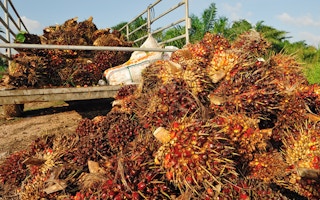Sales of certified sustainable palm oil (CSPO) are expected to hit a record high this year due to larger purchase commitments from main buyer countries, according to the Roundtable on Sustainable Palm Oil (RSPO), a group that promotes the production and use of sustainable palm oil.
In the first quarter of this year, CSPO sales rose 48.7 per cent to 506,586 metric tonnes — a new high on a quarterly basis, according to RSPO.
RSPO secretary-general Darrel Webber said Thursday that the group expected the upward sales trend seen in January-March to continue throughout this year, resulting in a new sales record.
“The significant increase in 2014 will mainly be driven by the food labelling regulation in Europe and national commitments from buyers,” he told reporters in a press briefing.
“
The Indonesian market is different from the European market, where there are demands for end products made from sustainable palm oil. Because such demand is still absent here, we need to introduce some consumer products bearing the RSPO logo
Desi Kusumadewi, RSPO Indonesia director
The European Union implemented this year a food labelling rule that requires food manufacturers to specify vegetable oils, including palm oil, they use in their food products.
Foodstuff containing sustainably produced palm oil will gain a competitive edge in the 28-member market over similar products made with uncertified palm oil.
Many countries in Europe, namely France, Germany, the Netherlands and Belgium, as well as the United States, have conveyed their commitment to endorsing palm oil products certified by the RSPO.
Webber further said that the positive outlook for this year might also persist throughout next year when big multinational corporations, such as Unilever, P&G and Nestle, would only use CSPO in their entire supply chain.
CSPO by RSPO growers reaches 9.7 million metric tonnes each year, representing almost 16 per cent of global palm oil output. The volume is generated by 1.97 million hectares of certified production area worldwide.
Since 2012, Indonesia has overtaken Malaysia to become the biggest supplier of CSPO and now contributes around 47.85 per cent of CSPO recognised under the RSPO scheme.
Its certified plantation areas have risen from covering less than 100,000 hectares in 2009 to more than 1 million hectares in 2013.
RSPO Indonesia director Desi Kusumadewi said that apart from boosting exports, the organisation would also encourage the absorption of CSPO in the domestic market.
Indonesia is the world’s second largest user of palm oil after India.
To raise awareness among Indonesian consumers on the use of certified palm oil in consumer products, Desi said that RSPO recently granted licenses to place RSPO logos on products to seven firms: PT Megasurya Mas, PT Mikie Oleo Nabati Industri, PT Asianagro Agungjaya, PT Musim Mas, PT Sinar Meadow International Indonesia, PT Sumi Asih Oleochemical and PT SMART.
“The Indonesian market is different from the European market, where there are demands for end products made from sustainable palm oil. Because such demand is still absent here, we need to introduce some consumer products bearing the RSPO logo,” she said.
In a separate development, RSPO — comprising among others growers, processors and traders — is slated to finish an ongoing joint study on the standards of RSPO and government-initiated Indonesian Sustainable Palm Oil (ISPO) in June.
The study will open the path to possible combined audits of palm oil plantations that will help reduce the time and cost of certification, according to Desi.
“After the study finishes, we will see the similarities and differences between the two certification schemes, therefore we can find ways to bridge the gaps,” Desi said.
The government has earlier requested a platform that acknowledges convergences among its mandatory ISPO and voluntary RSPO certification.










